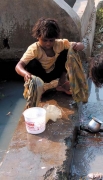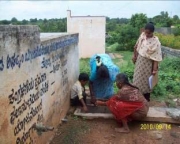India
Guidelines for water safety plans for rural water supply systems by the Sulabh International Academy of Environmental Sanitation
Posted on 27 Dec, 2010 07:20 PMThis document by the Sulabh International Academy of Environmental Sanitation presents the guidelines for water safety plans for rural water supply systems. The revised National Rural Drinking Water Programme (NRDWP) Guidelines 2009-2012 issued by Rajiv Gandhi National Drinking Water Mission, Department of Drinking Water and Sanitation has shifted the focus from source development and installation of water supply system for providing drinking water supply to rural household to focus on development of village security plan.
Interlinking of Rivers - Third report of the Standing Committee on Water Resources (2009-2010)
Posted on 27 Dec, 2010 04:55 PMThis report of the Standing Committee on Water Resources deals with the action taken by the Government on the recommendations and observations contained in their Eleventh Report on “Inter Linking of Rivers” which was presented to Lok Sabha in October 2008.
The Dam Safety Bill (2010) – Ministry of Water Resources
Posted on 27 Dec, 2010 11:00 AMThe Dam Safety bill, 2010 introduced in the Lok Sabha in August 2010 and approved by the cabinet earlier this year was referred to the Standing Committee on Water Resources, which was scheduled to submit its report within three months. The bill which is still pending seeks to provide for the surveillance, inspection and operation of all dams of certain parameters to ensure their safe functioning.
Preparation of strategic plan for rural drinking water sector in India – A draft discussion paper by the Department of Drinking Water Supply
Posted on 26 Dec, 2010 07:27 AMThis draft discussion paper by the Department of Drinking Water Supply (Ministry of Rural Development) deals with the preparation of strategic plan for rural drinking water sector in India. The Government of India introduced the Accelerated Rural Water Supply Programme (ARWSP) in 1972–73 to support States and UTs with financial and technical assistance to implement drinking water supply schemes in order to accelerate the pace of coverage across rural India.
Mitigating climate change through organic agriculture - Keynote address at the Third Organic Farming Association of India Convention, held at Anand, Gujarat (2010)
Posted on 25 Dec, 2010 10:43 PMGreen Revolution (GR) technologies, supported by official policies, and fuelled by agro-chemicals, machinery and irrigation, are well known to have improved agricultural production and productivity. While these technologies greatly helped developing countries to address their food-security and food-sovereignty needs, farmers using these technologies have had to depend on external inputs.
Rainfed areas and rice farming Crucial agricultural water issues
Posted on 25 Dec, 2010 08:30 PMJohn Thompson works on power, policy and sustainability issues in food and agriculture, water resource management and rural development. He is a STEPS Centre member, IDS Fellow and joint Co-ordinator of the Future Agricultures Consortium. He presents two crucial agricultural water issues to take priority on World Water Day.
Organic SRI rice: Indonesian woman talk about higher yields and health benefits
Posted on 25 Dec, 2010 08:28 PM
The economic impacts of inadequate sanitation in India: Rs. 2.4 Trillion equivalent of 6.4 per cent of GDP – A report by WSP
Posted on 24 Dec, 2010 09:27 AM This study report by the Water and Sanitation Programme (WSP), a global partnership administered by the World Bank suggests that inadequate sanitation causes India considerable economic losses, equivalent to 6.4 per cent of India's GDP in 2006 at Rs. 2.4 Trillion. It analyzed the evidence on the adverse economic impacts of inadequate sanitation, which include costs associated with death and disease, accessing and treating water, and losses in education, productivity, time, and tourism. The findings are based on 2006 figures, although a similar magnitude of losses is likely in later years.
This study report by the Water and Sanitation Programme (WSP), a global partnership administered by the World Bank suggests that inadequate sanitation causes India considerable economic losses, equivalent to 6.4 per cent of India's GDP in 2006 at Rs. 2.4 Trillion. It analyzed the evidence on the adverse economic impacts of inadequate sanitation, which include costs associated with death and disease, accessing and treating water, and losses in education, productivity, time, and tourism. The findings are based on 2006 figures, although a similar magnitude of losses is likely in later years.
The study focused on the safe management of human excreta and associated hygiene behavior. The methodology adopted by the study included disaggregating the economic impacts of inadequate sanitation into health-related impacts including premature deaths, costs of treating diseases, and productive time lost due to illnesses; domestic water-related impacts including household treatment of water, and money and time costs to obtain safe water; welfare losses including additional time spent by people for accessing toilets or open defecation sites, and girls having to miss school, and women not going to work; and the loss of potential tourism owing to inadequate sanitation.
Data on incidence (e.g. diarrheal diseases, deaths, etc.) were compiled from national sources (National Family Health Survey, WHO Demographic and Health Surveys, and other Govt. of India sources). Based on scientific literature, attribution factors were used to estimate the populations impacted by inadequate sanitation. Economic valuation was carried out using costs/prices based on secondary studies.
Film Festival on "Green Unplugged"
Posted on 23 Dec, 2010 12:05 PMContent and Image Courtesy: Culture Unplugged
Culture Unplugged Studios will be launching ‘Green Unplugged’ - the festival where we unite to explore the nature, that flows without & within us. This festival aspires to contemplate on the environment and the need to co-create future generation with love & respect for mother earth. It aspires to overlap the sound of our cry today with that of nature and hopes to collectively perceive a new path. We invite your conscious films that may help us all wake to our holistic future - an integral individual & human community thriving in co-existence with nature. With your co-operation, the festival hopes to bring context to our existence and reveal the evolving divine - the truth of life, hidden in nature‘s dream of tomorrow.
Benefits, issues and status of WATSAN systems - A survey of an IDWM project supported by Arghyam
Posted on 22 Dec, 2010 07:56 PM This paper presents the results of a survey of WATSAN systems implemented under an Integrated Domestic Water Management (IDWM) project supported by Arghyam and implemented by MYRADA and MYKAPS in Bangarpet and H D Kote blocks of Kolar district of Karnataka. Arghyam has promoted Roof-top Rain Water Harvesting (RRWH) and eco-sanitation systems in its various project areas through its partner organizations.
This paper presents the results of a survey of WATSAN systems implemented under an Integrated Domestic Water Management (IDWM) project supported by Arghyam and implemented by MYRADA and MYKAPS in Bangarpet and H D Kote blocks of Kolar district of Karnataka. Arghyam has promoted Roof-top Rain Water Harvesting (RRWH) and eco-sanitation systems in its various project areas through its partner organizations.
This project aimed at developing an integrated approach to domestic water management. It focused on construction of RRWH and eco-sanitation toilets in four villages in the project area in Kolar with the aim of creating models of integrated management of domestic water and sanitation in a rural set-up.